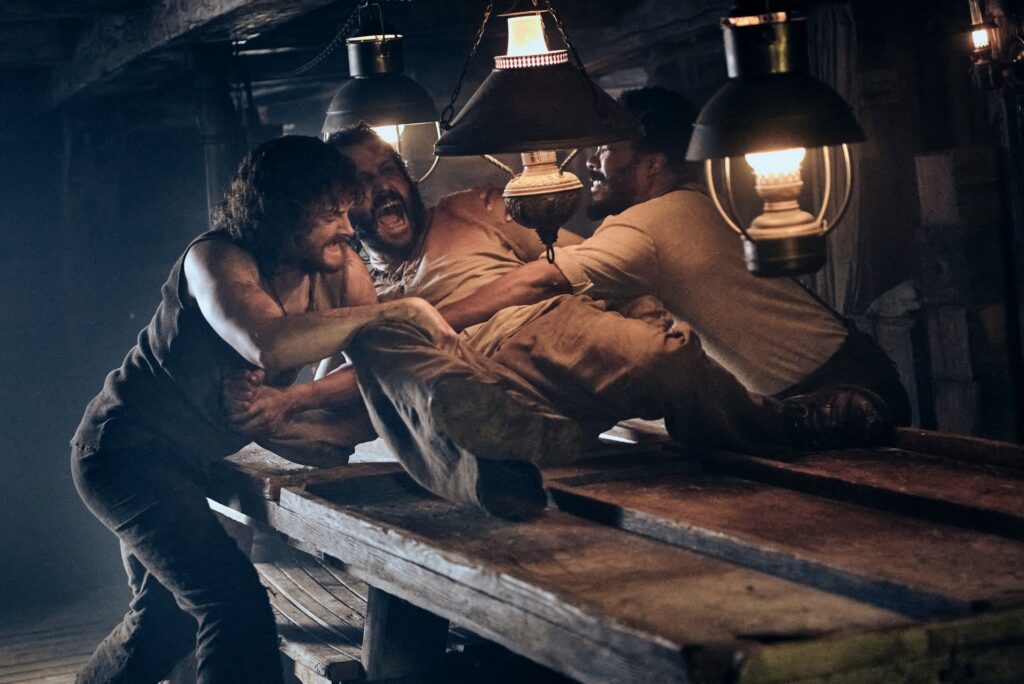
(**)
If a horror film goes for the jugular it has to have fangs. Right?
Taking a chapter from Bram Stoker’s 1897 novel Dracula and adapting it into a fright film is a good start. Great source, good premise, legendary story and characters. The right casting, astute direction, reams of dread, lots of thrills and plenty of astoundingly gory scenes are crucial. Yet, as this interpretation of a captain’s log outlines the fated transporting of Dracula from Transylvania to London, those vital elements are in place, but not glorious. Not at all.
In the late 1800s, a Captain Eliot (Liam Cunningham, Game of Thrones) has his first mate Wojcek (David Dastmalchian, Dune) add new crew members to his merchant ship, the Demeter. They will haul 50 wooden crates from Carpathia, which is near Transylvania, to London. They need the help. Some potential workers are spooked by the cargo, saying evilness is onboard. That frees up a position for Clemens (Corey Hawkins, The Tragedy of MacBeth), a doctor, academic and astronomer, a job hunter who had been turned down previously. Also, saving the captain’s grandson Toby (Woody Norman, C’mon C’mon) from a falling crate puts him in favor.
Something bothers the livestock in the cargo area. Formerly brazen rats hide and disappear. A ship without rodents is abnormal, so says the galley cook Joseph (Jon Jon Briones). Tension rises between the workers. The erudite Black man is envied by the jealous white crew. Friction intensifies further once a female stowaway, Anna (Aisling Franciosi, Game of Thrones), is found. To the brutes, a woman onboard brings bad luck. Bad luck will follow them, but in the guise of a neck biting, blood-sucking being that will bleed them dry. One by one. It is said: “Evil feeds on the blood of the innocent. And this one wears the skin of a man.” It’s Dracula.
Considering the director André Øvredal’s filmography (Trollhunter) and screenwriters Bragi F. Schut, Jr. (Escape Room) and Zak Olkewicz (Bullet Train), a horror/thriller fan might expect the action and gore to jump off the screen or at least provide giddy depravity. But nothing stands out. Nothing that matters. Not even the demon, who looks like he’s wearing a very scaly bodysuit and in need of a trip to the dentist for veneers. Yawn! Horror lore has it that if the villain’s look isn’t mind-numbingly scary, the film won’t be frightful either.
The period, place and culture are well established by production designer Edward Thomas (Resident Evil: The Final Chapter) and costume designer Carlo Poggioli (The New Pope). Streets, buildings and ship interiors look authentic enough and the clothes are suitably filthy and worn. Cinematographer Tom Stern (American Sniper) captures the verdant countryside, deep blue ocean and grisly murders well, while editor Patrick Larsgaard (The Trip) cuts scenes to their core.
Even with those attributes, the production elements don’t enhance what’s on view enough, and the musical score by Bear McCreary (Outlander) sounds generic, at best. It’s nearly 40 minutes before there’s a good scare—and that’s way too long. As the footage progresses, genre fans may hope for a visually arresting (The Hunger), campy (Buffy the Vampire Slayer), sexy (Bram Stocker’s Dracula), sleazy (The Addiction) or classic (Nosferatu) approach to the horror filmmaking. None shows up.
Øvredal, as a director, is not an auteur or a mischievous filmmaker. Plow ahead, choregraph the scenes, make characters die, count the bodies and build to a feeble ending. That’s it. Any hopes that writer Zak Olkewicz’s wild Bullet Train instincts might kick in and cause indescribable mayhem or lead to an unfathomable climax are dashed.
However, this flat unambitious showcase provides an opportunity for an instinctive, inventive actor to leave an impressive performance, regardless. A Jeffrey Wright, Christian Bale or Daniel Day Lewis would rise above the mire in the most raw or theatrical ways. Hawkins, a fine actor, choses a more subtle approach, which feels sufficient but not extraordinary.
When a crew member calls Clemens “Darkie,” and he responds, “If you call me that again I will…” It’s a weak line and lost moment. A savvy scribe would have him beat the antagonist’s ass or die trying. Like punching the bully in prison on the first day just to gain the respect of others. Briones, as the religious zealot chef, gets it right. He makes more of his character than what is on the page.
The whole production seems lost at sea. Much like the mysterious shipwreck Demeter, it crashes ashore empty.
Trailer: https://www.youtube.com/watch?v=6FgUUO9Ztd0
Visit NNPA News Wire Film Critic Dwight Brown at DwightBrownInk.com.